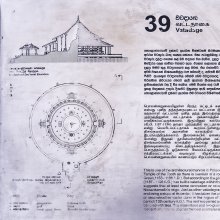Uka, Ūkā, Ukā: 10 definitions
Introduction:
Uka means something in Hinduism, Sanskrit, Buddhism, Pali, biology, Tamil. If you want to know the exact meaning, history, etymology or English translation of this term then check out the descriptions on this page. Add your comment or reference to a book if you want to contribute to this summary article.
Images (photo gallery)
In Hinduism
Vyakarana (Sanskrit grammar)
Source: Wikisource: A dictionary of Sanskrit grammar1) Uka (उक).—The kṛt. affix उकञ् (ukañ) applied to the roots लब्, पत्, पद् (lab, pat, pad) and others,e.g. लाषुकः, कामुकः (lāṣukaḥ, kāmukaḥ) etc. with udātta accent on the first syllable; cf.P.III.2.154;
2) Uka.—Tad.affix उक (uka) (उकञ् (ukañ)) added to the word कर्मन् (karman) e.g. कार्मुकं धनुः (kārmukaṃ dhanuḥ); cf. Kāś, on P.V.I.103.

Vyakarana (व्याकरण, vyākaraṇa) refers to Sanskrit grammar and represents one of the six additional sciences (vedanga) to be studied along with the Vedas. Vyakarana concerns itself with the rules of Sanskrit grammar and linguistic analysis in order to establish the correct context of words and sentences.
Biology (plants and animals)
Source: Google Books: CRC World Dictionary (Regional names)1) Uka in India is the name of a plant defined with Careya arborea in various botanical sources. This page contains potential references in Ayurveda, modern medicine, and other folk traditions or local practices It has the synonym Careya arborea Roxb. & Roxb. (among others).
2) Uka is also identified with Dillenia indica It has the synonym Dillenia speciosa Thunberg (etc.).
3) Uka is also identified with Salvadora persica It has the synonym Salvadora paniculata Zucc. ex Steud. (etc.).
Example references for further research on medicinal uses or toxicity (see latin names for full list):
· Blumea (1952)
· Hortus Bengalensis (1814)
· Flora Indica (1832)
· Pl. Corom. (1811)
· Cytologia (1988)
· Flora de Filipinas (1837)
If you are looking for specific details regarding Uka, for example health benefits, pregnancy safety, chemical composition, side effects, diet and recipes, extract dosage, have a look at these references.

This sections includes definitions from the five kingdoms of living things: Animals, Plants, Fungi, Protists and Monera. It will include both the official binomial nomenclature (scientific names usually in Latin) as well as regional spellings and variants.
Languages of India and abroad
Pali-English dictionary
Source: Sutta: The Pali Text Society's Pali-English DictionaryŪkā, (f.) (Sk. yūkā, prob. dialectical) a louse J. I, 453; II, 324; III, 393; V, 298; Miln. 11; Vism. 445; DhsA. 307, 319; DhA. III, 342; VvA. 86.
is also used as linear measure (cp. Sk. yūkālikṣaṃ) VbhA. 343 (where 7 likkhā are said to equal 1 ūkā). (Page 158)

Pali is the language of the Tipiṭaka, which is the sacred canon of Theravāda Buddhism and contains much of the Buddha’s speech. Closeley related to Sanskrit, both languages are used interchangeably between religions.
Sanskrit dictionary
Source: DDSA: The practical Sanskrit-English dictionaryUkā (उका).—Residue.
Source: Cologne Digital Sanskrit Dictionaries: Monier-Williams Sanskrit-English DictionaryUka (उक):—ind. [gana] cādi, [Pāṇini 1-4, 57.]
Source: Cologne Digital Sanskrit Dictionaries: Yates Sanskrit-English DictionaryUkā (उका):—(kā) 1. f. Dregs.
[Sanskrit to German]
Sanskrit, also spelled संस्कृतम् (saṃskṛtam), is an ancient language of India commonly seen as the grandmother of the Indo-European language family (even English!). Closely allied with Prakrit and Pali, Sanskrit is more exhaustive in both grammar and terms and has the most extensive collection of literature in the world, greatly surpassing its sister-languages Greek and Latin.
Kannada-English dictionary
Source: Alar: Kannada-English corpusŪka (ಊಕ):—
1) [noun] exertion or striving, mental or physical; effort.
2) [noun] weariness caused by physical or mental effort.
3) [noun] a difficult condition; trouble; distress.
--- OR ---
Ūka (ಊಕ):—
1) [noun] the act of thinking seriously and deeply; pondering; meditation.
2) [noun] mental distress or agitation resulting from concern usu. for something impending or anticipated; worry.
--- OR ---
Ūka (ಊಕ):—[noun] a small, flat, wingless insect with sucking mouthparts, parasitic in the hair of humans; the head louse (Pediculus humanus capitis order; Anoplura).
Kannada is a Dravidian language (as opposed to the Indo-European language family) mainly spoken in the southwestern region of India.
Tamil dictionary
Source: DDSA: University of Madras: Tamil LexiconUka (உக) [ukattal] 12 intransitive verb To ascend, rise stately, soar upward; உயர்தல். மாவிசும் புகந்து [uyarthal. mavisum puganthu] (பத்துப்பாட்டு: மதுரைக்காஞ்சி [pathuppattu: mathuraikkanchi] 334).
--- OR ---
Uka (உக) [ukattal] 12 verb < உவ-. [uva-.] intransitive To be glad, pleased, satisfied; மகிழ்தல். [magizhthal.] (நாலாயிர திவ்யப்பிரபந்தம் இயற். [nalayira thivyappirapandam iyar.] 2, 8.) — transitive To desire, hanker after; விரும்பு தல். காக்கை யுகக்கும் பிணம் [virumbu thal. kakkai yugakkum pinam] (வாக்குண்டாம் [vakkundam] 24).
--- OR ---
Ukā (உகா) noun
1. Tooth-brush tree, small tree, Salvadora persica; ஓமை. (பிங்கலகண்டு) [omai. (pingalagandu)]
2. [Malayalam: uha-maram.] Sandpaper-tree, large tree, Dillenia indica; உவாமரம். (வைத்திய மலையகராதி) [uvamaram. (vaithiya malaiyagarathi)]
Tamil is an ancient language of India from the Dravidian family spoken by roughly 250 million people mainly in southern India and Sri Lanka.
See also (Relevant definitions)
Starts with (+74): Uka-nka, Ukab, Ukaba, Ukada, Ukadaamba, Ukadagare, Ukadahandi, Ukadalonacem, Ukadanem, Ukadapitha, Ukadapoli, Ukadava, Ukadetandula, Ukadhamba, Ukadimva, Ukadum, Ukai, Ukakaka, Ukal, Ukala.
Ends with (+2108): A chi duka, Aanethanthu vaaluka, Aaphuka, Aba fuka, Abhavuka, Abhibhavuka, Abhicaruka, Abhicharuka, Abhigamuka, Abhikshuka, Abhilashuka, Abhiluka, Abhimanuka, Abhiruka, Abhishuka, Abhramukamuka, Abhuka, Abhyarohuka, Abhyayuka, Abimduka.
Full-text (+58): Uga, Yayajuka, Dandashuka, Vavaduka, Jagaruka, Saluka, Bhikshuka, Jaluka, Uruvuka, Ukam, Bhalluka, Bandhuka, Ukan, Progastotra, Progaciti, Progacit, Uvattekku, Progashastra, Kauna'oa uka, Praugadhyaya.
Relevant text
Search found 15 books and stories containing Uka, Uga, Ugaa, Ūkā, Ukā, Ūka; (plurals include: Ukas, Ugas, Ugaas, Ūkās, Ukās, Ūkas). You can also click to the full overview containing English textual excerpts. Below are direct links for the most relevant articles:
Chaitanya Bhagavata (by Bhumipati Dāsa)
Verse 3.5.551 < [Chapter 5 - The Pastimes of Nityānanda]
Rig Veda (translation and commentary) (by H. H. Wilson)
Rig Veda 10.130.3 < [Sukta 130]
Tiruvaymoli (Thiruvaimozhi): English translation (by S. Satyamurthi Ayyangar)
Pasuram 2.4.6 < [Section 4 - Fourth Tiruvaymoli (Ati ati)]
Prasthanatrayi Swaminarayan Bhashyam (Study) (by Sadhu Gyanananddas)
8.2. Significance of Sevā (service) < [Chapter 4 - Analysis on the Basis of Spiritual Endeavour]
Puranic encyclopaedia (by Vettam Mani)
Amarakoshodghatana of Kshirasvamin (study) (by A. Yamuna Devi)
Etymological Derivations of Kṣīrasvāmin < [Chapter 6 - Grammatical Aspects]

